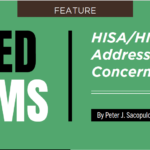Source: Daily Report for Executives: News Archive > 2011 > October > 10/07/2011 > Special Report > Electronic Commerce: Attorneys Urge Caution as Physicians Promote Services on Daily Deal Websites
195 DER C-4
Electronic Commerce
Attorneys Urge Caution as Physicians
Promote Services on Daily Deal Websites
CHICAGO—Daily-deal websites like Groupon and LivingSocial continue to grow in popularity, but one entrepeneur’s Groupon-inspired business that focuses the internet-based, coupon-club model exclusively on the practice of medicine is prompting raised eyebrows from health care attorneys.
Susan Nicholas, a cardiovascular surgeon by training, founded Atlanta-based DocPons Inc. in February. Nicholas said DocPons is the first-to-market health care vertical of Groupon. The website calls itself a comprehensive health care company that provides high quality, discounted, outpatient health services in 40 different practice areas. The business caters to all consumers, but seeks to fill an important gap in health services for consumers who are uninsured, underinsured or trapped in high-deductible health plans.
DocPons already offers services in Atlanta, but the company plans to launch in New York and Washington, D.C., before the end of the year.
Nicholas said DocPons fills an important void in the market because Groupon and LivingSocial have been unable to provide consumers with a comprehensive approach to health services.
“Groupon is focusing on cosmetics and vanity services, not outpatient health care,’’ Nicholas told BNA. “So it’s not things like filling cavities, providing dentures, kidney dialysis appointments, and oncology appointments for people who need chemotherapeutics on an outpatient basis. That’s what we’re doing at DocPons. We’re doing real true health care. We are beyond a coupon company or an Internet company. We are a comprehensive health care company. That is what will differentiate us in the marketplace from a Groupon or a LivingSocial or copycats coming out.’’
Ethics Issues Raised
But DocPons features the same business model favored by other daily deal websites, raising several potential ethical problems, including fee splitting, for medical professionals. Nicholas noted that she takes a 40 percent commission per voucher for medical services sold on DocPons before forwarding the remainder to the physician offering his or her services.
Michael J. Sacopulos, a partner with Sacopulos, Johnson & Sacopulos in Terre Haute, Ind., has reviewed the DocPons business model and warned physicians to stay away until state medical ethics boards issue specific guidelines on such business models.
“I don’t think she (Nicholas) fully appreciates the issue, and that’s a little surprising given her background,’’said Sacopulos, who focuses his practice on medical malpractice defense. “I see this as a violation of ethical codes and certainly of fee splitting. I don’t want to torpedo anyone’s business, but I certainly would be uncomfortable, as a physician, using that service.’’
Michael Schaff, chair of the corporate and health care departments at Wilentz, Goldman & Spitzer P.A. in Woodbridge, N.J., said physicians interacting with DocPons and other coupon club websites might be inviting inquiries by the federal government under the Stark laws governing physician referrals of Medicare and Medicaid patients, and federal anti-kickback statutes.
Schaff said physicians engaging in such transactions could also trigger insurance investigations. He said an insurance company likely would scrutinize the discounted rate for an offered medical service to see if it conflicts with the rate specified in its agreement with the physician.
“There are people out there noticing that health care spending just keep going up, and they think there all kinds of great business opportunities,’’ Schaff said. “So they get involved in the health care business without doing proper due diligence. They don’t understand the Stark laws, they don’t understand the anti-kickback laws, they don’t fully understand the corporate practice of medicine doctrine.’’
Nicholas rejected the suggestion that DocPons transactions could trigger fee splitting inquiries by state ethics boards because the company does nothing that might influence the relationship between the physician and the patient.
“Once we pay a practitioner for the service, just like Groupon does, the relationship is done,’’ she said. “There is no involvement with the patient, there is no violation of HIPAA (the Health Insurance Portability and Accountability Act), we don’t know the diagnosis, we don’t do anything with the patient. We just have an online place for them to come together.’’
Nicholas said DocPons also helps physicians price their services to avoid inquiries by federally sponsored programs and private insurers.
“We ask the provider to think about how to make their outpatient visits affordable,’’ Nicholas said. “So we tell them to choose a price on their DocPon that is over the federal reimbursement for that service—the federal government has to be the lowest cost provider—and then look where you break even on that. Then the price of the DocPon needs to be somewhere between.’’





